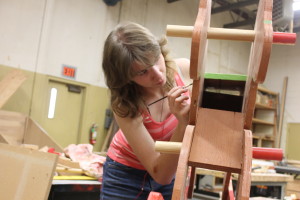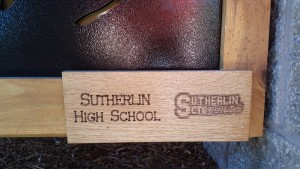
Roseburg High School students work with soil samples as part of a CTE agriculture exercise. Photo courtesy of Roseburg Public Schools
Honing a workforce
Community, students benefit from school Career & Technical Education programs
When computers or overhead projectors break down in schools, some teachers send for IT help. For a few years in Sutherlin High classes attended by Chris Tello, the catchprase was, “Just ask Chris.”
Tech savvy came naturally to Tello, class of 2015. That said, he recalls getting the chance to ramp up that ability every school day in SHS’ information/technology classes. The courses represent one of three branches of the school’s Career & Technical Education (CTE) program.
“I was constantly applying skills to better myself and actually doing school projects to keep from losing those skills,” said Tello, now a 19-year-old freshman at the University of Oregon. Besides studying, he works at a part-time job as a student tech assistant for the ResNet Help Desk. ResNet is the Internet and computer service provided to residents living in university housing. Among other tasks, Tello helps solves Internet connection problems, removes viruses on student computers and connects mobile and wireless devices to the UO network. He hasn’t yet decided what career to pursue, but some options are surveyor, cartographer or map analyst.

Chris Tello, a 2015 Sutherlin High grad, works as a tech assistant at the University of Oregon. Tello’s experience in Sutherlin High CTE classes helped qualify him for the part-time job at U of O, where he’s a freshman. Photo courtesy of Chris Tello
Tello said if it hadn’t been for the equipment available to him in his CTE classes, he would have fewer access to scholarships and work experience. Independent study courses especially allowed him to generate projects he could apply away from the classroom, he said.
“It helped set me up for college and for life outside of high school.”
Prepping students for success beyond high school is a major aim of CTE, as educators recognize. That’s why Douglas County teachers and administrators were celebrating in January, when the Oregon Department of Education and Oregon Bureau of Labor and Industries announced recipients of CTE revitalization grants.
Roseburg High School received two sets of grant funding totaling $358,909. In addition, 13 CTE programs from eight Douglas County schools netted awards ranging from $2,000 to $45,000 in Career Pathways Funding, reflecting a total of $156,521.
Click here to see details on how the revitalization funds will be used. More information about the Career Pathways grants can be found here.
The awards demonstrate a shift in thinking that career/technical/vocational classes are an afterthought for students who aren’t bound for four-year colleges and universities. The classes themselves are dispelling a notion that Douglas County does not have a trained workforce, according to Roseburg High School CTE Program Director Sheri Carson.
Carson said many people, including employers, don’t realize that schools have moved away from the old-style shop classes and home economic classes. She pointed out that CTE programs at RHS have approved programs of study, and that several provide an opportunity for students to earn college credit.
“’We have many programs that are working with industry on a regular basis and are providing skills that students can exit high school with,” Carson said. Students can either deploy those skills in a career or take short-term jobs to furnish money to further their education.
CTE programs at RHS are culinary arts (includes catering for a hospitality, tourism and recreation class), early childhood education (through which some students work in the school-run day care center), business/marketing, agriculture (including veterinary science), construction/woods, metal/manufacturing and drafting/engineering.

A Roseburg High student does detail work on a rocking horse that started as a drafting project and became part of a CTE woodshop class. Photos courtesy of Roseburg Public Schools
Currently, RHS students are at work on projects for Great Northern Trailer Works of Sutherlin, Fabform Industries Inc. of Roseburg, Whit-Log Trailers of Wilbur and North River Boats of Roseburg, among others.
CTE programs can also be found at Days Creek and Elkton charter schools and at Douglas, North Douglas, Riddle, Yoncalla, Glendale, Glide, Oakland, South Umpqua and Sutherlin high schools.
Graduation rates for students in CTE programs are near 90 percent, according to the National Association of State Directors of Career Technical Education Consortium.
What CTE programs represent in Douglas County is the ability to provide employees for businesses here at home, RHS’s Carson said.
“Our goal is to provide the education and skills to our students and to then have them stay in the county and work,” she said. “If we train them, we want them to stay here and give back to the community that gave them their opportunities.”
And that means the community has a role to play as well. As Carson points out, education has changed since parents and grandparents were in school. Yet adults can do their part to bring education and industry together in a way that benefits everyone.
“We are trying to create employees, but we need those family members to support education and remind their students that school is a training ground,” Carson said.
At school, students learn to be on time, as with a job, she said. They come to understand not only the importance of regular attendance, but also deadlines, comprehending tasks and getting along with others, particularly those in authority.
Sutherlin High graduate Chris Tello said he remembers how some students figured CTE classes were only for those who wanted an easy A grade, or a place “where all you’re doing is plugging in wires.”
If he could give advice to current SHS students, that would be to try a CTE class at least once.
“It’s not institutionalized, and you aren’t all lumped in this one spot,” he said. “I’d encourage people to try whatever elective they’re interested in, because they work with you so that you are able to generate projects that involve work experience.”

To see what Sutherlin CTE students are working on, visit www.shscte.org, www.sutherlinffa.org or www.pinterest.com/shscte/

Leave a Reply
You must be logged in to post a comment.